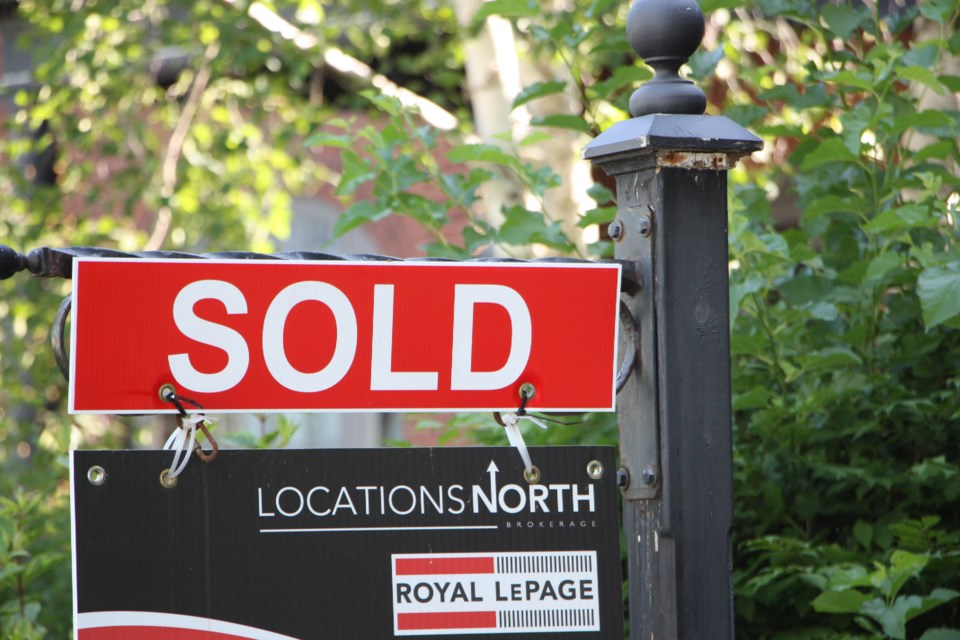Watching the value of a home climb has many thinking about the prospects of cashing in, if they haven’t already.
Buyers who continue to overwhelm the number of houses for sale across the region are tripping over themselves to close deals by offering over asking and presenting firm offers. During the first 12 days of April, 64 per cent of offers presented on Simcoe County homes had no conditions, observed a local real estate agent.
The Barrie and District Association of Realtors reported a 41.8 per cent increased value in residential property sales in Simcoe County during the first quarter of 2021 compared to the same period last year, bringing the average price to $750,301.
It is the latest indication of an upward market largely considered to not be sustainable.
There are now widespread concerns that an increasing number of people who aren’t now in the housing market may never have a chance to own their own home. Unless there’s some sort of a cooling of the market, that is.
With the federal budget just a week away, there are calls for the government to take some initiative, either through legislation or policy to somehow control the ever-increasing house values.
Senior economists with Canada’s top banks have floated several ideas to temper the market, such as the imposition of a speculation tax, banning blind bidding, a capital gains tax, and raising interest rates.
There is already an initiative to bump up the stress test, first introduced in 2018, which sets out a formula attached to the affordability of a home purchase, capping the amount people can spend on a home proportionate to their income. A more stringent stress test will shrink the buyer pool which could, in turn shrink prices.
The Office of the Superintendent of Financial Institutions announced last week the possibility of raising the qualification. If it’s approved it will come into effect May 1.
That means buyers applying for a mortgage must qualify at the higher of either 5.25 per cent or two per cent above the prime rate. That, in turn, is expected to reduce the maximum purchase price by about four per cent, said Chantal Godard, president of the Barrie and District Association of Realtors (BDAR).
“Historically, this has usually worked to cool down, but what it’s done is it’s created an additional frenzy of buying” prior to the implementation of the more stringent qualification rules, she said. “Once it was implemented, it took a little bit of the froth off the market, but prior to that it was nuts.”
Godard points out that a home buyer with an annual income of $100,000 can now buy a $700,000 home with 20 per cent down. If implemented, that buyer under the new strategy would only be able to access $630,000 in financing through traditional institutions with 20 per cent down.
“We’re going into a hot spring market, so I think that’s just going to end up fuelling that and increasing the sale price of the homes,” Godard said. “The intention is to try and make housing more affordable and reduce prices and lessening what people qualify for and it’s also to protect buyers in case there ever is an increase in interest rates.”
Godard would like to see “more creative solutions" to housing, such as creating multi-unit residences and incentive programs to develop them as well as examining the prospect of tiny homes development.
Sarah Stevens, who teaches economics at Georgian College and is a realtor, said it all comes down to supply and demand. When interest rates eventually increase, a natural cooling will follow.
What’s happened locally, she added, is that this area has become a magnet for buyers and investors from the Toronto market, many of whom are cashing in on that larger market, buying a desirable piece of property here at a lower price, and banking the rest of the proceeds of the Toronto sale.
That, in turn, has homeowners here thinking of cashing in and selling secondary property, or selling their home and either renting or moving to a cheaper market.
“They’re thinking this is the right time to sell and I’m telling them it is,” said Stevens. “This is a very good time to sell.
“We’re starting to see sellers recognize, ‘Hey, there’s good prices out here.’ We’ve seen that volume pick up with sellers specifically in the Barrie market," she added. "But we still don’t have enough of a supply in all the other outlying areas to meet the demand and that’s why we’re still seeing strong prices.”
She points out that real estate accounts for more than 10 per cent of Canada's gross domestic product (GDP) and she questions any interference through the imposition of cooling measures. Increasing interest rates will eventually temper the market, she says.
The post-pandemic world may also present new circumstances as people return to the workplace and perhaps won’t be as flexible to work from home in more distant places, Stevens says.
A booming real estate market, she added, ties into other economic activity, such as renovations and retail.
One scenario floated is to tax the increased value of the home. Currently, the primary residence is exempt from capital gains tax, which only applies to secondary dwellings.
But Barrie-Springwater-Oro-Medonte MP Doug Shipley thinks this approach would be a mistake.
“A lot of people work their whole lives, their home is their investment. That’s what a lot of people plan on using as their retirement fund,” he said. “We’ll have to wait to see when the budget comes out.”
